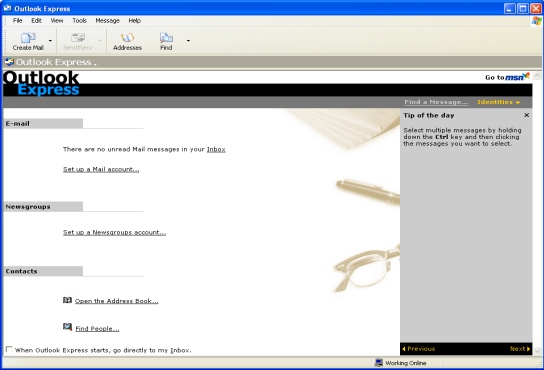
When E-Mail Is Not Just Mail Anymore: The History of Microsoft's Mail Clients
The following information is part opinion and part fact. Ruggiero AV Services (Joseph A. Ruggiero, Jr., author) makes no claim to performance of one e-mail client over another, except for what has been personally observed. This article does not even begin to touch on the various third-party e-mail clients available, some of which are "better" and more feature-laden than Microsoft's offerings. We present this as a personal account of our experiences with using and supporting Microsoft products, including Outlook, Outlook Express, and the new Windows Live Mail Desktop application. Some information for this article was provided by Wikipedia.
When Internet Explorer 4.0 was released, much controversy surrounded it, due to its "integrated" architecture. There was also a new e-mail client included, and it was a step up from the "Internet Mail and News" client featured with Internet Explorer 3.0. A notable feature of the new mail client, dubbed Outlook Express, was that it supported "HTML Mail" as opposed to plain text and Rich Text Format messages.

Outlook Express shared a similar name to Microsoft's business-level mail client, Outlook (97, 98, 2000, 2003, 2007, etc) but they were not the same. This was evident when Outlook Express users tried to trade mail messages with users of Outlook or Exchange, Microsoft's corporate mail server. Because Outlook messages tended to contain more data (meeting requests, task lists, etc), they could not always be read properly by Outlook Express.
Also, because the early focus was on the corporate side of e-mail, Outlook Express's early incarnations suffered from some flaws, most notably mail database corruption, causing lost messages, as well as security issues due to the newly implemented HTML message format. Since mail messages could now be mini "web sites" they were prone to the same script-execution bugs and viruses which plagued Microsoft's Internet Explorer browser. The latest updates to Outlook Express, now at version 6, fixes these flaws in the following manner:
Outlook Express now makes automatic backups of the e-mail database during compaction of messages.
HTML composing and reading is now off by default, in favor of plain-text messages.
Downloading of e-mail attachments and images is now disabled by default
One remaining Outlook Express bug that has survived in all versions is the inconsistent handling of secure or signed e-mail. Signed messages do not show up inline, but rather as attachments. Couple that with the fact that Outlook Express now disables attachments by default (though it does not remove them from the message), and you see the problem.
All this being said, Outlook Express was and still is fine for the average home user who had 1 or 2 e-mail accounts (OE allowed access to multiple accounts at once, including Microsoft's own Hotmail, a feature that Outlook itself lacked, for obvious reasons). The mail database, mentioned above, could easily be re-directed to another location, such as a second hard drive (but not a network drive), making mail backup and transfer to a new machine easier. This "re-routable database" feature, although not highly-publicized, was missing from Outlook, as well as later incarnations of Microsoft's mail clients, until the release of Windows Live Mail Desktop and even then, early versions of Live Mail Desktop were buggy in their implementation of this database or mail store.
Another point in favor of Outlook Express over any incarnation of Outlook, or early incarnations of Windows Live Mail Desktop is speed, especially when dealing with IMAP accounts. Outlook Express can access IMAP folders rather quickly, whereas Outlook and early versions of Windows Live Mail Desktop would hang for several seconds when accessing IMAP accounts.
Those die-hard Windows XP fans who are holding on to Outlook Express will be okay for the time being - Outlook Express will continue to be updated until Windows XP's End-of-Product Lifecycle. Microsoft now offers their next-generation mail software, called WINDOWS LIVE MAIL (DESKTOP) which can be downloaded for free. In fact, Ruggiero AV Services recommends that users first upgrade to Windows Live Mail from within XP, if planning to perform an upgrade to Windows Vista, since all account and e-mail message information will migrate over, and the built-in mail software in Vista (Windows Mail) will not be set as default. I describe Outlook Express's brother, Vista's "Windows Mail", as well as its own successor, Windows Live Mail, below:
 Windows
Mail was shipped with the new Windows Vista operating system, as a
successor to Outlook Express. It had minor interface changes,
although it did borrow some features from Outlook 2003,
including the right-hand "reading pane." Windows mail also featured
internal changes which fixed some of Outlook Express's shortcomings.
Windows
Mail was shipped with the new Windows Vista operating system, as a
successor to Outlook Express. It had minor interface changes,
although it did borrow some features from Outlook 2003,
including the right-hand "reading pane." Windows mail also featured
internal changes which fixed some of Outlook Express's shortcomings.
Windows
Live Mail is developed by the same team that wrote Windows Mail for
Vista. It takes the best of Vista's Windows Mail, and adds the
following:
The final version of Windows Live Mail was released on November 6, 2007. It can be installed using Windows Live Installer.
Last personal note -- I was actually ready to give up on the
newer versions of Microsoft's Mail clients, holding out like many with my tried
and true Outlook Express, but can wholeheartedly say that Microsoft got it right
with Windows Live Mail. It has what worked well in Outlook Express, and
adds proper support for mail standards and also provides protection against
modern-day e-mail threats. So, in answer to the question - is there hope
for Outlook Express users? I say YES. If you plan to stick with
Microsoft's consumer mail solutions, Windows Live Mail fits the bill perfectly.
GET WINDOWS LIVE MAIL --
http://get.live.com/wlmail/overview*
The latest version of Windows Live Mail was released in September 2010. It features bug fixes and improvements, part of Windows Live Essentials. Windows Live Essentials also includes Windows Live Messenger, Photo Gallery, Movie Maker, Writer, Family Safety, Windows Live Mesh, Bing Bar, Messenger Companion, Microsoft Silverlight, and Outlook Connector Pack (Microsoft Outlook Hotmail Connector and Social Connector Provider for Windows Live Messenger). You can install just Mail or all of Windows Live Essentials.
CLICK
HERE TO GO BACK TO THE PAGE YOU CAME
FROM
OR
CLICK
HERE TO RETURN TO
RUGGIERO AV SERVICES HOME